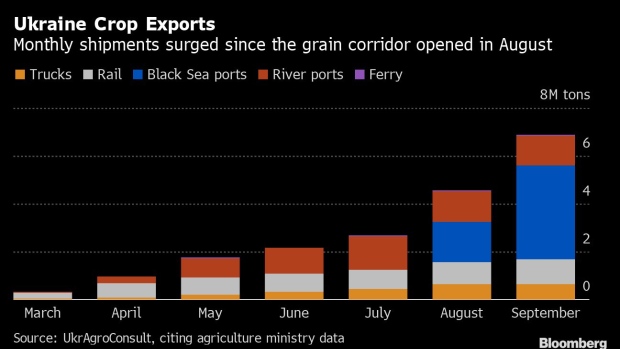Oct 30, 2022
Wheat Soars After Russia Exits Pact Allowing Ukraine Exports
, Bloomberg News

(Bloomberg) -- Wheat prices soared after Russia suspended a deal guaranteeing safe passage of Ukrainian exports, with Moscow warning that shipments become “much riskier” without its participation.
While grain vessels are still sailing from Ukraine’s Black Sea ports, it’s unclear how long that will last after Russia’s weekend withdrawal. Deliveries of Ukrainian crops to port are grinding to a halt amid the uncertainty.
Russia hit two civilian tugboats involved in transporting a barge with grain near Ochakiv, to the east of a UN-agreed corridor that had been used for exports, according to a post from the Ukrainian military’s southern command on Facebook.
Read: Russia Suspends Ukraine Grain Export Deal; Biden Slams Move
Ukraine is one of the world’s biggest suppliers of wheat, corn and vegetable oil and the July pact to open three Black Sea ports has been vital to help alleviate a global food crisis.
Russia’s announcement that it would indefinitely suspend involvement in the safe-passage agreement, which was brokered by Turkey and the United Nations, drew widespread condemnation from Ukraine and its allies, with US President Joe Biden warning it would increase starvation.
Wheat in Chicago settled 6.4% higher at $8.8225 a bushel, after earlier jumping as much as 7.7%. Corn climbed 1.6% and soybean oil rose 2%.
The latest uncertainty comes as the International Grains Council estimates global grain stockpiles at an eight-year low this season. Supply is coming under increasing pressure, most recently as drought in Argentina and heavy rain in Australia hamper wheat crops nearing harvest there.
The UN and Turkey have been scrambling to salvage the agreement and analysts said shipping and insurance costs are likely to rise even if seaborne exports continue. New deals had already been drying up for Ukrainian exports ahead of a Nov. 19 deadline to renew the pact.
The UN announced late Sunday it had held discussions with all the parties to the deal, and agreed with Turkey and Ukraine to have vessels carrying food continue departing from Ukraine. Russian delegates were informed, the UN said.
Kremlin spokesman Dmitry Peskov said Monday that grain shipments from Ukraine’s Black Sea ports become “much riskier” after Russia suspended participation, but he declined to comment on what conditions Moscow is setting out for rejoining the pact. He said diplomatic consultations are underway with Turkey and the UN.
Earlier, Ukraine said Russia launched a massive wave of missile attacks across the country, after the Kremlin accused Kyiv of strikes against its Black Sea fleet.
Ships are moving from Ukraine under the basis that Russia has only temporarily suspended its participation in the deal, but is still a signatory to the agreement, Ismini Palla, a UN spokeswoman for the Black Sea Grain Initiative, said Monday by phone. Under the terms of the initiative, all parties agreed not to undertake attacks against merchant and civilian ships.
Cargoes flowing from inland largely stopped as of Monday morning, said Kateryna Rybachenko, vice chair of the Ukrainian Agribusiness Club. That includes a train loaded Sunday by Ago-Region -- a farming company where she is a board member -- with 3,500 tons of corn.
Twelve outbound and four inbound ships were expected to move through the Ukraine corridor Monday, the UN said late Sunday. The Turkish defense minister said he will discuss the deal with his Russian counterpart Monday evening.
Read: How War Is Keeping Ukraine’s Grain Off World’s Plates: QuickTake
Vessel and insurance rates to Ukraine are likely to rise, said Michael Magdovitz, a senior commodity analyst at Rabobank. New deals from the country had already been drying up as traders didn’t want to risk getting caught short of the agreement’s deadline, said Matt Ammermann, commodity risk manager at StoneX.
While Ukraine has shipped more than 9 million tons of goods since the corridor opened -- including more than 4 million tons just this month -- there is still lots left to go. Silos were already overflowing with last year’s crops when seaborne exports resumed and farmers are now reaping a new harvest, while planting wheat and barley that will be collected next year.
“The grain corridor is a powerful channel for the export of Ukrainian agricultural products, and the closure of this channel is critical, both for the domestic market and for the world market,” Andriy Kupchenko, head of analytics at APK-Inform, said in a note.
--With assistance from Kevin Varley, Mumbi Gitau and Jen Skerritt.
©2022 Bloomberg L.P.






